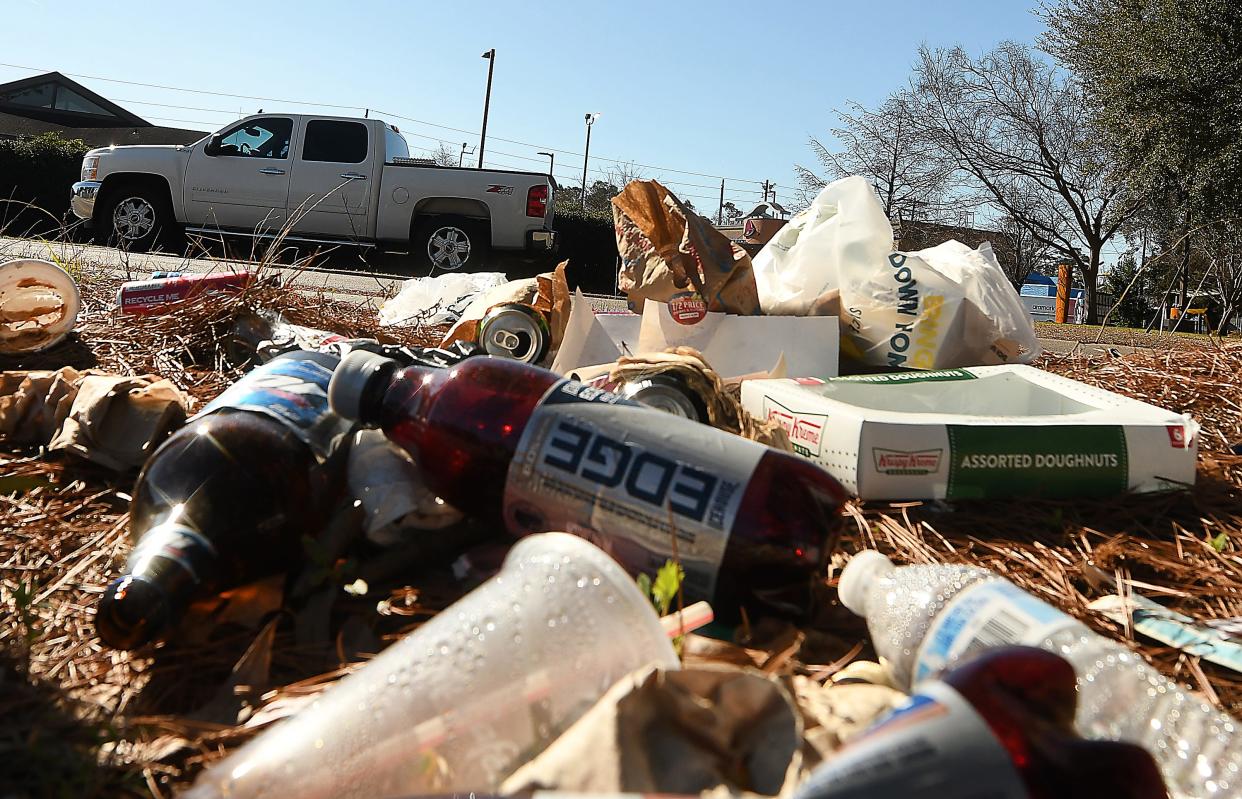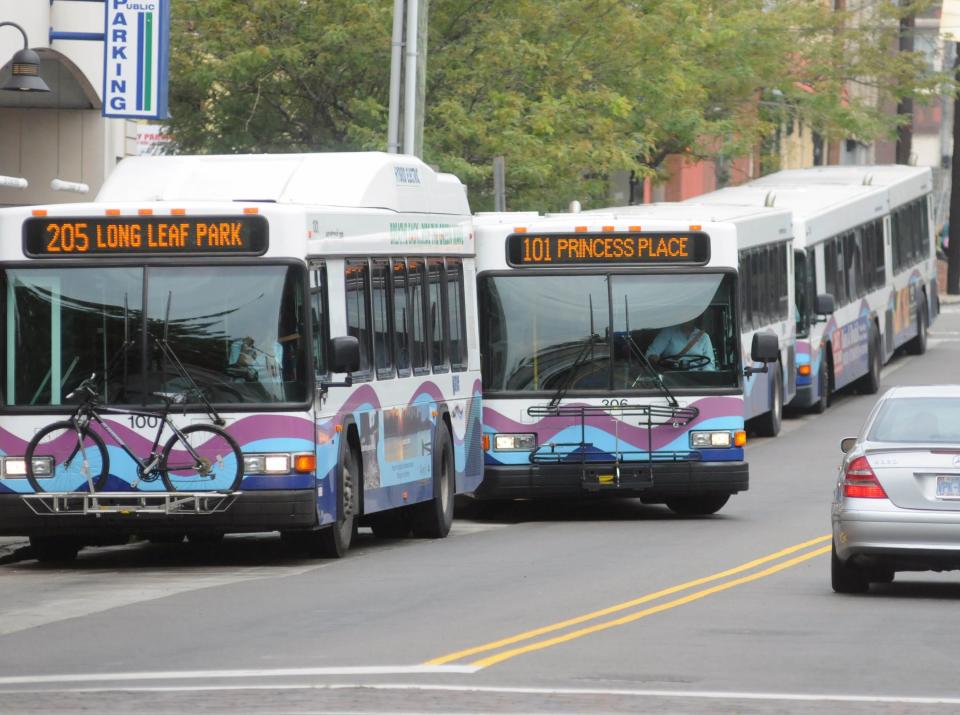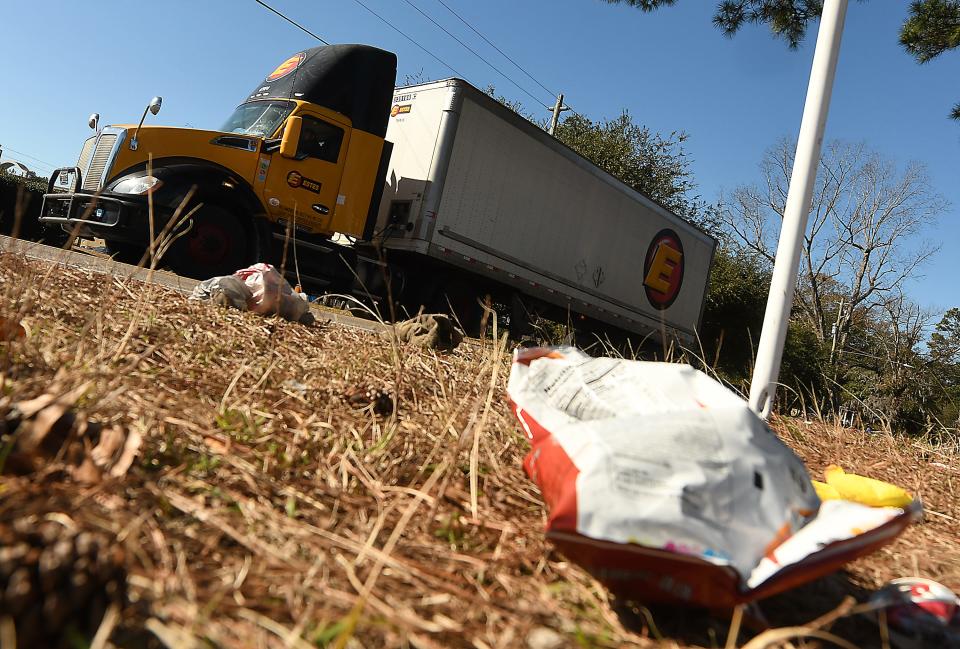A garbage problem: Study tracks trash cans at more than 200 Wilmington bus stops

Rob Clark is quick to acknowledge Wilmington has a problem with litter. It's something Clark's employer, environmental nonprofit Cape Fear River Watch, has repeatedly tried to tackle.
Now, Clark, the group's water quality programs manager, is working on a study that focuses on trash littering at a very specific part of the city: its bus stops.
The project, which is still in its data collection stage, is tracking the infrastructure at various bus stops, the locations of bus stops with trash cans and how that compares to demographics of the surrounding neighborhood.
Drawing on field observations and conversations with Wilmington residents, Clark has hypothesized there are fewer trash cans at bus stops located in low income areas and communities of color.
But only the data will show whether that theory is accurate, Clark said.
A prime example of the need for waste infrastructure is a bus stop near the corner of Princess Place and Birchwood drives in Wilmington. A brick trash receptacle was removed from the site last summer by the city of Wilmington after it was vandalized.
More: The city removed a trash can near a bus stop. Now people are throwing trash on the ground.
More: Wilmington bus stop gets new trash can after concerns from neighbor
It took months for the receptacle to be replaced. In that interim, Clark said he recorded more than 700 individual pieces of trash within 50 feet of the stop. Nearby business owners also expressed concerns about the lack of a receptacle and how the trash affected perceptions of the area.
For Cape Fear River Watch, loose trash on the ground poses a potential for pollution and a threat to water quality.
Since bus stops are usually located along the street, rain or flooding can easily carry trash into nearby storm drains.
“Those storm drain systems flow into our creek systems, our creek systems flow into the river and the river flows into the ocean,” Clark said.
Since January, Clark has partnered with Connor Willis, a student at the University of North Carolina at Wilmington and former River Watch intern, to conduct an inventory of the trash and waste infrastructure at more than 200 bus stops throughout Wilmington and New Hanover County.

Whenever their schedules align, but usually on Fridays, Clark and Willis head out to document trash at several bus stops, Clark said.
They start by saving a picture of the bus stop and its infrastructure in an app used to record their findings. They then work through a list that allows them to check off the infrastructure surrounding the stop, including trash cans, benches and overhangs or other shelters.
Although they're primarily concerned with the trash cans and other receptacles at bus stops, Clark said he wanted to collect a complete inventory of each stop's infrastructure.
Next, the two set about collecting and counting any trash within 50 feet of the bus stop. Armed with a bucket and trash picker, Clark picks up any trash from cigarette butts to plastic bottles and fast food wrappers, calling out each piece for Willis to record.
They cover an area that spans 50 feet to each side of the stop in order to simulate typical rider behavior.
“I basically tried to mimic what people would do as they walked to the bus stop, whether getting on or off,” Clark said.
The two can hit about 15 bus stops over a period of several hours, according to Clark. To date, they've inventoried 165 bus stops with 39 stops to go.

They won't hit all of New Hanover County's more than 400 bus stops, Clark said; they don't have the time or financial means. But they've carefully chosen stops for data collection that will allow the results to be extrapolated to the entire transit system.
Once data collection is complete, Clark and Willis will work with a UNCW sociology professor to analyze their bus stop inventories and determine whether the data supports their hypothesis.
“If our hypothesis is borne out … we want to use that data as leverage to go to WAVE or the city – whoever's in charge of maintaining and installing those trash cans – to get a more equitable distribution of trash cans throughout our public transit system,” Clark said.
Collecting the data has shown Clark and Willis that people don't necessarily want to throw trash on the ground, sometimes there's just not a trash can available.
In some cases, local residents and other groups seem to have stepped in to fill the gap. Clark and Willis have found "homemade cans" at several stops, including a concrete cylinder and a small burning barrel.
“It’s not that people don’t care," Clark said. "It’s that the infrastructure is just not there.”
Reporter Emma Dill can be reached at 910-343-2096 or edill@gannett.com.
This article originally appeared on Wilmington StarNews: Wilmington advocates track litter, trash cans at local bus stops
